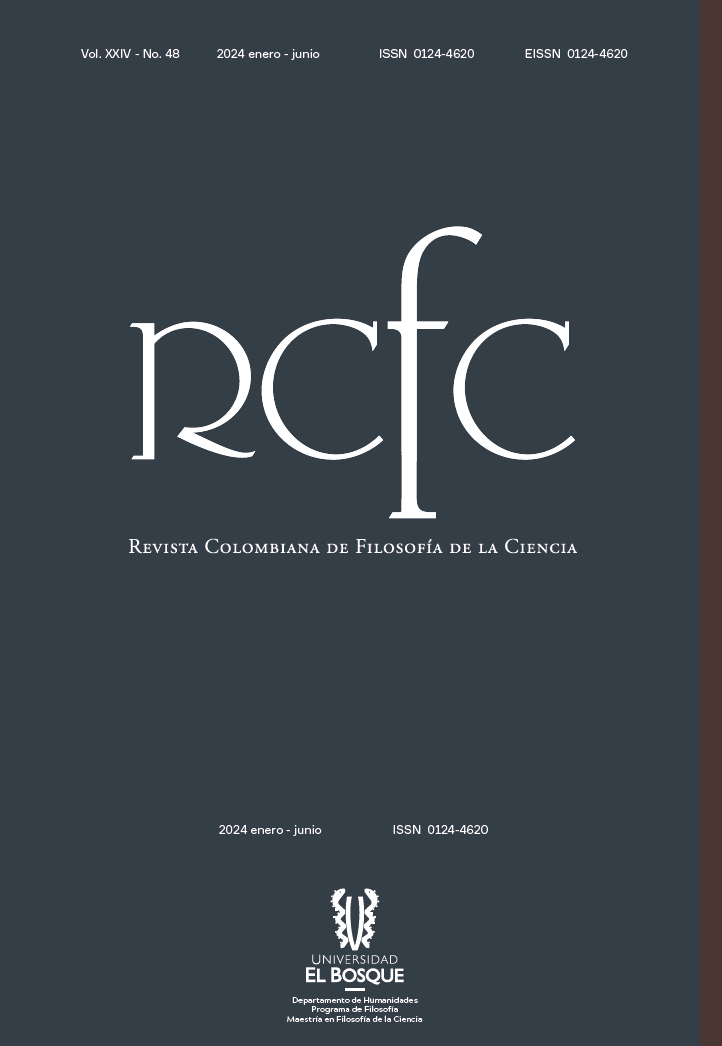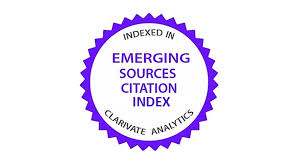La economía folk y la ciencia económica
DOI:
https://doi.org/10.18270/rcfc.4229Palabras clave:
epistemología, conocimiento, creencia, creencia folk, ciencia folk, economía, ventaja comparativa epistémica, sesgos cognitivos, moral, políticaResumen
El desarrollo de la ciencia ha producido una brecha entre el conocimiento aceptado por las comunidades científicas y las creencias populares. Esto ha preocupado a los científicos al considerar que muchas de esas creencias resultan ser insostenibles. Además de los problemas relativos a la educación y la divulgación científica, el estudio de las creencias folk plantea interesantes interrogantes para la epistemología y las ciencias cognitivas acerca de los procesos de formación y justificación del conocimiento. Este tema tiene también importantes repercusiones en cuanto a las acciones, partiendo de que las creencias folk pueden motivar decisiones erróneas. El objetivo del presente artículo es analizar las creencias folk relativas al ámbito económico, mostrando algunas de sus posibles causas y algunas consecuencias en lo tocante a la toma de decisiones.
Descargas
Referencias bibliográficas
Ang, Yuen Yuen. How China Escaped the Poverty Trap. Cornell University Press, 2016.
Ayau Cordón, Manuel F. El proceso económico. Descripción de los mecanismos espontáneos de la cooperación social. Editorial Centro de Estudios Económicos Sociales, 2003.
Baron, Jonathan. Thinking and Deciding. Cambridge University Press, 2007.
Bastiat, Frédéric. “Lo que se ve y lo que no se ve, 1850”. Obras escogidas. Madrid: Unión Editorial, 2004. 22-58.
Bhalla, Surjit S. The New Wealth of Nations. Nueva Deli: Simon and Schuster, 2018.
Bhagwati, Jagdish y Arvind Panagariya. Why Growth Matters: How Economic Growth in India Reduced Poverty and the Lessons for Other Developing Countries. Nueva York: Public Affairs, 2013.
Boyer, Pascal., y Petersen, Michael B. “Folk-economic Beliefs: An Evolutionary Cognitve Model”. Behevorial and Brain Sciences. Cambridge University Press, 2018. 1-65. <https://doi.org/10.1017/s0140525x17001960>
Brown, Cecil H. “Folk Botanical Life-forms: Their Universality and Growth”. American Anthropologist 79.2 (1977): 317-342. <https://doi.org/10.1525/aa.1977.79.2.02a00080 >
____. “Folk Zoological Life-forms: Their Universality and Growth”. American Anthropologist 81.4 (1979): 791–817. <https://doi.org/10.1525/AA.1977.79.2.02A00080>
Buchanan, James M. “Politics Without Romance: A Sketch of Positive Public Choice Theory and Its Normative Implications”. The Collected Works of James M. Buchanan. Indianápolis: Liberty Fund, 1999. 45-69.
Caplan, Bryan. “What Makes People Think Like Economist? Evidence on Economic Cognition from the ‘Survey of Americans and Economists on the Economy’”. Journal of Law and Economics 44.2 (2001): 395-426. <https://doi.org/10.1086/322812>
____. “Sociotropes, Systemic Bias, and Political Failure: Reflexions on the Survey of Americans and Economists on the Economy”. Social Science Quaterly 83.2 (2002a): 416-435. <https://doi.org/10.1111/1540-6237.00092>
____. “Sistematic Biased Beliefs About Economics. Robust Evidence on Judgemental Anomalies from the Survey of Americans and Economists on the Economy”. The Economic Journal 112.479 (2002b): 433-458. <https://doi.org/10.1111/1468-0297.00041>
____. “How Do Voters form Positive Economic Beliefs? Evidence from the Survey of Americans and Economists on the Economy”. Public Choice 128.1 (2006): 367-381. <https://doi.org/10.1007/s11127-006-9026-z>
____. The Myth of the Rational Voter. Why Democracies Choose Bad Policies. Princeton University Press, 2007. <https://doi.org/10.1515/9781400828821>
Coleman, William Oliver. Economics and Its Enemies. Two Centuries of Anti-Economics. Nueva York: Palgrave Macmillan, 2002.
Deaton, Angus. The Great Escape. Health, Wealth, and the Origins of Inequality. Princeton: Princeton University Press, 2013.
Descartes, René. Meditaciones metafísicas (y otros textos). Tomo II. Madrid: Gredos, 2011.
Elster, Jon. Una introducción a Karl Marx. Ciudad de México: Siglo XXI, 1991.
Evans, Jonathan y Keith Frankish. In Two Minds: Dual Processes and Beyond. Oxford University Press, 2012.
Friedman, Milton y Rose Friedman. Free to Choose: A Personal Statement. Nueva York: HBJ, 1980.
Gwartney, James D. et ál. Common Sense Economics. What Everyone Should Know About Wealth and Economics. Nueva York: St. Martin’s Press, 2016.
Haidt, Jonathan. The Righteous Mind. Why Good People Are Divided by Politics and Religion. Nueva York: Pantheon Books, 2012.
Hannon, Michael y Jeroen de Ridder. The Routledge Handbook of Political Epistemology. Londres: Routledge, 2021.
Hayes, Patrick J. “The Naive Physics Manifesto”. Expert Systems on Micro-electronic Age. Ed. Donald Michie. Edinburgh University Press, 1979.
____. “The Second Naive Physics Manifesto”. Formal Theories of the Commonsense World. Eds. Hobbs, Jerry R. y Moore Robert C., Menlo Park CA: SRI International, 1983. 1-36. <https://doi.org/10.1016/B978-1-4832-1447-4.50010-9>
Hazlitt, Henry. Economics in One Lesson. Nueva York: Harper & Brothers, 1946.
Heyne, Paul. “Are Economists Basically Immoral?”. ‘Are Economists Basically Immoral?’ and Other Essays on Economics, Ethics, and Religion. Eds. Brennan, Geoffrey y Waterman, A.M.C. Indianápolis: Liberty Fund, 2008. 1-9.
Hutt, William H. Politically Impossible…? An Essay on the Supossed Electoral Obstacles Impeding the Economical Analysis into Politics or Why Politicians Do Not Take Economic Advice. Westerham Kent: Institute of Economic Affairs, 1971.
Jackendoff, Ray. “The Structure of Language. Why it Matters to Education”. Conferencia en Learning and Brain. Cambridge, 5-8 noviembre 2003. <https://peeps.unet.brandeis.edu/~jackendo/StructureofLanguage1.pdf>
Jevons, William Stanley. “Brief Account of a General Mathematical Theory of Political Economy”. Journal of the Royal Statistical Society, vol. XXIX, 1862. 282-287.
Kahneman, Daniel et ál. Judgement under Uncertainity: Heuristics and Biases. Cambridge University Press, 1982. <https://doi.org/10.1126/science.185.4157.1124>
Kahneman, Daniel. et ál. Heuristics and Biases. The Psychology of Intuitive Judgement. Cambridge University Press, 2002.
Lal, Deepak. Poverty and Progress. Realities and Myths about Global Poverty. Washington: Cato Institute, 2013.
Mankiw, Gregory N. Principles of Economics. Boston: Cengage, 2021.
Menger, Carl. Grundsätze der Volkswirthaftslehre. Viena: Braumüller, 1871.
Newcomb, Simon. “The Problem of Economic Education”. The Quaterly Journal of Economics 7.4 (1893): 375-399. <https://doi.org/10.2307/1882282>
Niemietz, Kristian. Socialism: The Failed Idea That Never Dies. Londres: IEA, 2019.
Parkin, Michael. Economics. Essex: Pearson, 2015.
Peirce, Charles S. “The Fixation of Belief, 1877”. Peirce on Signs. Ed. James Hoopes. University of North Carolina, 1991. 144-159.
Pinker, Steven. The Blank Slate. The Modern Denial of Human Nature. Nueva York: Penguin Books, 2002.
____. Enlightment Now. The Case for Reason, Science, Humanism, and Progress. Nueva York: Penguin Books, 2018.
Preston, Carol. “Folk Linguistics”. Encyclopedia of Language and Linguistics 2ª ed. Eds. Brown, Keith. Ámsterdam: Elsevier, 2006. 521-533.
Price, Henry H. “Some Considerations About Belief”. Proceedings of the Aristotelian Society 35: Oxford: Oxford University Press, 1934 – 1935. 229-252.
Rothbard, M. N. “Ludwig von Mises, su esencia”. Ludwig von Mises. Infatigable luchador contra la economía ficticia. Ciudad de México: Centro de Estudios en Economía y Educación, A.C. 1983. 20-52.
Rubin, Paul H. “Folk Economics”. Southern Economic Journal 7.1 (2003): 157-171. <https://doi.org/10.1002/j.2325-8012.2003.tb00561.x>
Schettino, Macario. Introducción a la economía para no economistas. Pearson Educación de México, 2002.
____. Economía en un día. Ciudad de México: Paidós, 2015.
Smith, Adam. An Inquiry into the Nature and Causes of the Wealth of the Nations, 1776. Indianápolis: Liberty Fund, 1976.
Smith, Barry y Roberto Casati. “Naive Physics”. Philosophical Psychology 7.2 (1994): 227-247. <https://doi.org/10.1080/09515089408573121>
Sowell, Thomas. Economic Facts and Fallacies. Nueva York: Perseus Books Group, 2011.
____. Basic Economics. Nueva York: Perseus Books Group, 2015.
Von Böhm-Bawerk, Eugen. Kapital und Kapitalzins. Inssbruck: Wagner, 1884.
Walras, Léon. Éléments d’économie politique pure. Lausana: Corbaz, 1874.
Wheelan, Charles. Naked Economics. Undressing the Dismal Science. Nueva York: W.W. Norton & Company, 2019.
Wolpert, Lewis. The Unnatural Nature of Science. Cambridge, MA: Harvard University Press, 1992.
Descargas
Publicado
Cómo citar
Número
Sección
Licencia

Esta obra está bajo una licencia internacional Creative Commons Atribución-NoComercial-SinDerivadas 4.0.

| Estadísticas de artículo | |
|---|---|
| Vistas de resúmenes | |
| Vistas de PDF | |
| Descargas de PDF | |
| Vistas de HTML | |
| Otras vistas | |











